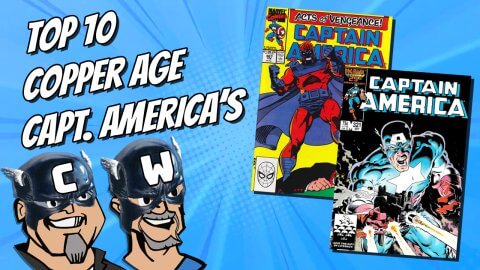 Every week Comic Culture hosts Chris Owen and Walter Durajlija talk the comic book talk.
Every week Comic Culture hosts Chris Owen and Walter Durajlija talk the comic book talk.
So kick back, relax and enjoy this week’s Comic Culture.
Oh, and please, please make sure you go out and support your local comic book shop.
Comic Culture is written by Walter Durajlija and engineered by Chris Owen.
Enjoy Comic Culture’s June 27th, 2018 Edition:




Re bidding on Fox, Walt made this statement:
“Historically that [extended bidding] gets you [the seller] more money.”
This might be the anecdotal feeling, but the scholarly research that I noted in my comment to the last (late lamented?) Auction Highlights indicates that this is generally not the case. Here are three references:
https://web.stanford.edu/~jdlevin/Papers/Auctions.pdf
https://www.sciencedirect.com/science/article/pii/S0899825608000523
https://pubsonline.informs.org/doi/abs/10.1287/isre.2015.0606
These all indicate that open auctions are better _for everybody_. The abstract for the last reference above: “In contrast to conventional wisdom that ‘the more bids the better’ and industry practice of treating sealed bid auctions as a premium feature, our results suggest that the buyer surplus gained from the reduction in valuation uncertainty enabled by open bid auctions outweighs the buyer surplus gained from the higher competition uncertainty in sealed bid auctions…”
I think that this makes a lot of sense with a simple argument – would you rather know the market clearing price approximately or precisely? Precisely is better information = better for everybody. I know that it _feels_ like the open bid CC approach (similarly the Heritage approach) allows people to keep rethinking their bid, but you have to be honest about how CL (or eBay) bids are entered. You don’t, in a vacuum, say “I value that book at $100 so I will bid $100”. Instead you say “I value that book at $100 – but if I lose it at $101, after thinking hard about my valuation, I am going to feel cheated, so I had better bid $110”, or “I can’t be bothered to come up with an exact estimate of my valuation [which would have been $100] because it’s likely that high sealed bids will come in, so I will only enter my lowball bid of $90 that I am sure is good.” As the market is highly illiquid – only a handful of bidders for most books – this leads to more scatter.
I believe that the CC open format also gives the community better information about the dynamics for each book. For some books, there is a small community of “at (nearly) any price” people, while for others there is a more uniform set of level-headed collectors/investors. You can view the “at any price” guys going against each other in the CC auctions, while in the CL auctions it could be that, or it could be a couple of the latter type just overestimating what the final bid level will be. If those guys didn’t see significant last minute bidding in a CC-type auction they possibly would not have put out such a number, and in that case the CC result would actually come lower than the CL result.
So: why do buyers and sellers like sealed (CL-type) auctions? I think the answer is clear: excitement. There is an element of gambling in these auctions that is missing from open (CC-type) auctions. You said as much yourself in describing the process: “that person could have had…” It is a mystery what all of the other bidders are willing to bid, because all of you will wait to enter your bids until the last second. This is similar to a lottery draw, and people clearly will pay for this thrill of discovery (as the lottery odds are so much against you that there has to be another explanation for why people continue to play). You have some of this up until the last few minutes in CC auctions (and last few seconds in Heritage auctions), but then it becomes the sad grind of supply and demand that we have to deal with in our usual economic interactions.
So my view is that – all else held equal – sellers and buyers would only choose eBay and CL to consume excitement, not to get the “best” price on a book. However, the dynamics are complicated, and all else is not equal. If the excitement is worth very much to many sellers and buyers, and the broker (e.g. CL) doesn’t charge for this, sellers will see more bidders by listing on the sealed bid site. Therefore sellers who don’t value excitement will still choose the sealed bid site because they will get more bidders. Peculiarly, using this line of argument, it is possible that CL results would be _higher_ than CC results due to more buyers. (I believe that high-end comic buyers are actually quite level-headed and naturally driven to ferret out unique situations and bargains, which is why to the best of my observation, CC and CL results are similar.)
(As an aside, ASM #129 is a bad example because it is so liquid. A better example is Adventure #210, which just finished last night on eBay. This was around $2k near the end of the auction, and finished for $3.3k at the last minute. In the current market I observe a set of high-dollar investors who are willing to pay new highs for keys, and they have only very vague ideas of what these highs should be. I believe that the whole market would be better off if these highs were settled through CC-type open auctions than through one-shot eBay snipes.)
(As a second aside: I bought my house in the hot old days of 2004 in a sealed bid. Maybe another reason I am not a fan…)
—–
I have been to the Baltimore Con for the past couple years and I can vouch for it. As the advisor comments in the Guide indicate, this is more of a comic BOOK con than most, and many big dealers from the east of the Mississippi attend. It is also a very easy Con to attend – easy and pretty cheap parking/lodging within a couple blocks of the Convention Center.
Great stuff Chris – I have heard great things about buying old comics at the Baltimore con, I’ve heard the Charlotte N.C. con is good too.
Nice points on the CC and CL auctions – I think some type of books do better in the CC format while others do better on the CL. These days they are both too high ! I can’t catch a bargain lately.
Nice show Chris and Walt !!! Enjoy your summer break